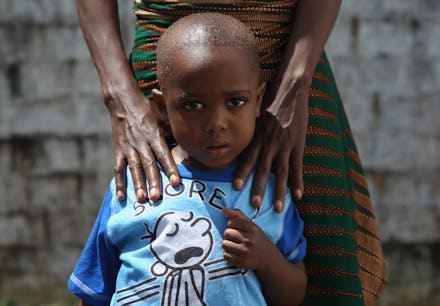The Survivors: Powerful Portraits of the Liberians Who Beat Ebola

More than 4,400 people have died from Ebola in West Africa. The World Health Organization has projected as many as 10,000 new cases a week in Guinea, Liberia and Sierra Leone by the end of 2014.
While media organizations fixate on the rising death toll in a distant part of the world, there's one group that's being overlooked: the survivors.
Ebola has a 70% mortality rate, and those who manage to recover are left immune to the disease. But these survivors, like 24-year-old Benetha Coleman, lost family members along the way. Coleman lost her husband and two children to Ebola and contracted the disease while taking care of family members without access to proper protective gear.
To help humanize the overwhelming statistics, Pulitzer Prize-winning photographer and senior staff photographer at Getty Images, John Moore, visited an Ebola treatment center of the organization Doctors Without Borders in Paynesville, Liberia. At the treatment center, survivors spoke about the brothers, sisters, husbands and wives they lost to the disease. They also spoke of recovery, stigmas they continue to face in their villages and renewed hope.
Sontay Massaley, 37
Varney Taylor, 26
Anthony Naileh, 46, and Bendu Naileh, 34
James Harris, 29
James Mulbah, 2
Ami Subah, 39
Jeremra Cooper, 16
Lassana Jabeteh, 36
Mohammed Bah, 39
Benetha Coleman, 24
Recent news of an Ebola-free Senegal brings a bright spot in a global health crisis that has made orphans and widows of many of the survivors. Though Senegal's success is emerging as a model, a consistent response is still much-needed across the region.
According to a WHO draft internal document reported in the Guardian, "nearly everyone involved in the outbreak response failed to see some fairly plain writing on the wall." Now that a semblance of recovery is taking in West Africa, the next step may involve seeking justice. Who will the survivors hold accountable for their loss and drastically changed lives?